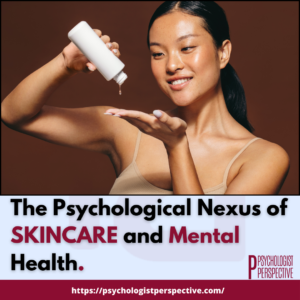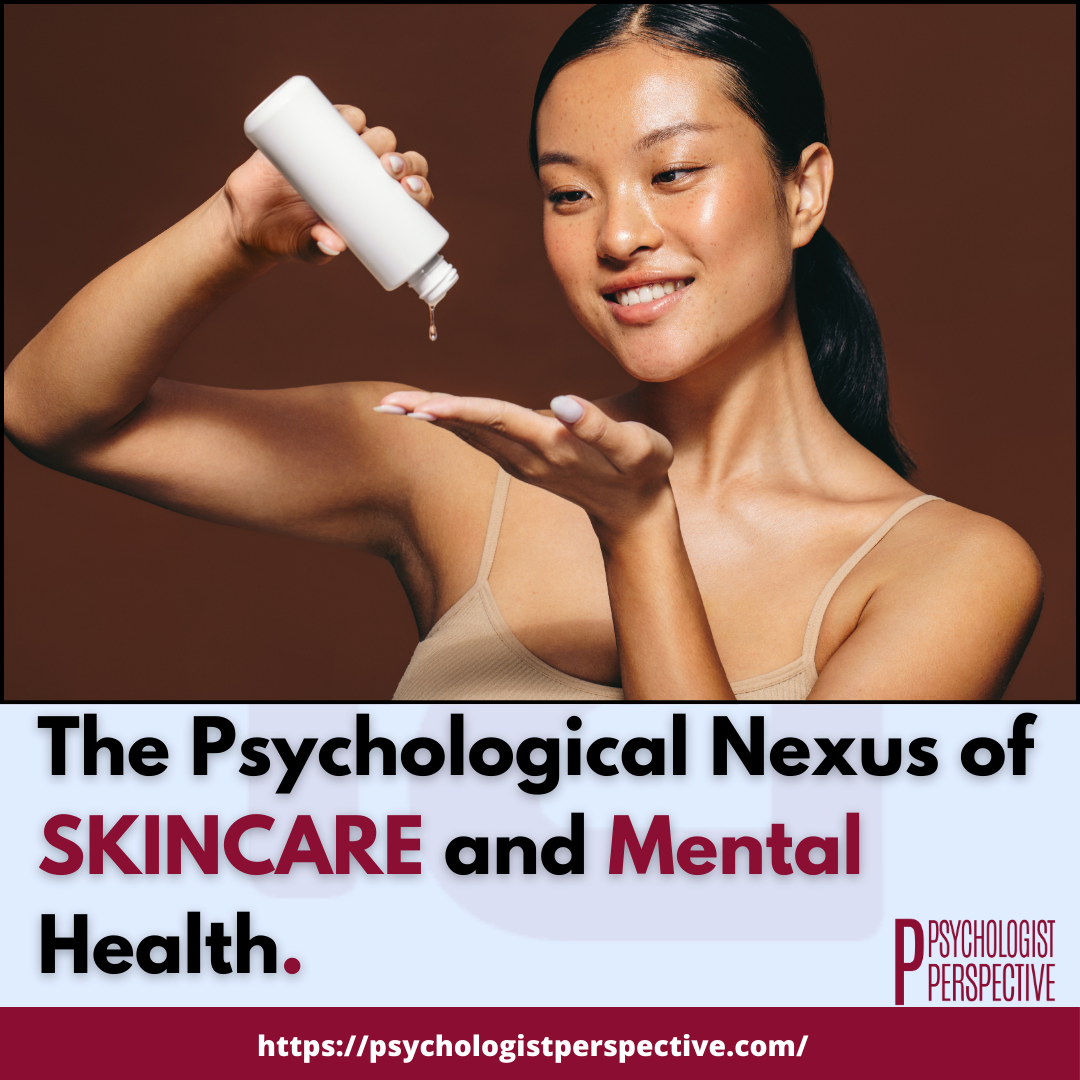The Psychological Nexus of SKINCARE and Mental Health:
Did you know that on average, individuals spend over $100 a month on skincare products, yet many still feel dissatisfied with their skin’s appearance? What drives this relentless quest for perfection, and what psychological factors influence our skincare choices?
Join me on a journey as we delve into the captivating world of skincare psychology, and its mental health effects.
WHAT IS SKINCARE?
Skincare refers to the practices and products used to maintain the health and appearance of the skin. It encompasses a wide range of activities and treatments designed to cleanse, hydrate, protect, and treat the skin to keep it looking and feeling its best.
Skincare typically involves:
1.Cleansing:
Removing dirt, oil, makeup, and impurities from the skin using cleansers, face washes, or cleansing balms. Cleansing helps prevent breakouts, congestion, and dullness by keeping the pores clear and the skin clean.
2.Moisturizing:
Hydrating the skin to maintain its natural moisture balance and prevent dryness. Moisturizers come in various forms, including creams, lotions, and serums, and may contain ingredients like hyaluronic acid, glycerin, or oils to lock in moisture and keep the skin soft and supple.
3.Sun Protection:
Applying sunscreen or sunblock to shield the skin from the harmful effects of UV radiation, including sunburn, premature aging, and skin cancer. Sunscreen should be worn daily, even on cloudy days, to protect the skin from UVA and UVB rays.
4.Treatment:
Addressing specific skin concerns such as acne, hyperpigmentation, wrinkles, or sensitivity with targeted treatments and products. This may involve using ingredients like retinoids, alpha hydroxy acids (AHAs), or vitamin C to improve skin texture, tone, and clarity.
5.Exfoliation:
Removing dead skin cells and promoting cell turnover to reveal smoother, brighter skin underneath. Exfoliation can be achieved through physical scrubs, chemical exfoliants, or exfoliating masks, depending on skin type and preference.
6.Hydration:
Keeping the skin hydrated from the inside out by drinking plenty of water and using hydrating skincare products. Proper hydration is essential for maintaining skin elasticity, plumpness, and overall health.
Skincare routines can be tailored to individual skin types, concerns, and preferences, and may vary depending on factors such as age, lifestyle, climate, and environmental exposure. Consistent and personalized skincare practices can help improve the appearance and health of the skin, promoting a radiant, youthful complexion.
How it is related to mental health:
The intersection of psychology and skincare is fascinating. In our quest for healthy, radiant skin, we often overlook the profound impact that skincare can have on our mental well-being. Beyond the surface-level benefits of a clear complexion lies a deeper connection between skincare practices and our psychological health. From boosting self-esteem to providing moments of self-care and relaxation, the relationship between skincare and mental well-being is intricate and significant.
1.Self-Care Rituals:
Engaging in skincare routines can serve as powerful acts of self-care, nurturing both the body and the mind. Taking time to cleanse, moisturize, and pamper the skin can provide moments of tranquility and mindfulness in our busy lives. These rituals offer an opportunity to slow down, focus on ourselves, and cultivate a sense of inner peace.
2.Stress Reduction:
Research suggests that skincare rituals can help alleviate stress and anxiety. The sensory experience of applying skincare products, such as the soothing textures and pleasant scents, can have calming effects on the nervous system. Additionally, the repetitive motions involved in skincare routines can induce a meditative state, promoting relaxation and stress relief.
3.Self-Confidence:
The appearance of our skin can significantly impact our self-esteem and confidence levels. Clear, healthy skin is often associated with beauty and vitality, leading to feelings of self-assurance and empowerment. Conversely, skin issues such as acne or eczema can undermine our confidence and trigger negative emotions. By addressing skincare concerns, we can enhance our self-image and boost our overall well-being.
4.Body Image:
Skincare practices also play a role in shaping our body image perceptions. In a society that places a high value on flawless skin, individuals may feel pressure to attain unrealistic beauty standards. This can lead to feelings of inadequacy and dissatisfaction with one’s appearance. By fostering a positive relationship with our skin through proper care and acceptance, we can cultivate a healthier body image and improve our mental health.
In essence, the relationship between skincare and mental well-being is symbiotic, with each influencing the other in profound ways. By prioritizing self-care, managing stress, and fostering a positive body image, we can harness the transformative power of skincare to nurture not only our skin but also our minds and spirits. In doing so, we embark on a journey towards holistic wellness and self-fulfillment.so, start your skincare journey today!



